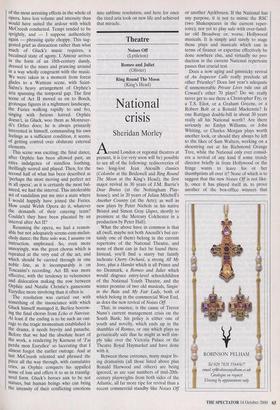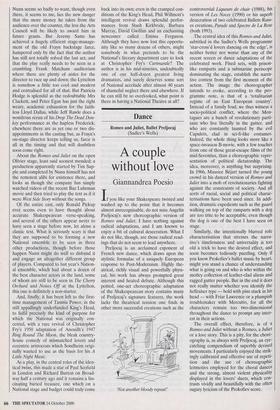Theatre
Noises Off (Lyttleton) Romeo and Juliet (Olivier) Ring Round The Moon (King's Head)
National crisis
Sheridan Morley
Aound London or regional theatres at present, it is (or very soon will be) possible to see all of the following: rediscoveries of two long-lost Jean Anouilh classics (Colombe at the Bridewell and Ring Round The Moon at the King's Head); the first major revival in 30 years of J.M. Barrie's Dear Brutus (at the Nottingham Play- house); and in 20 years of Julian Mitchell's Another Country (at the Arts); as well as new plays by Peter Nichols in his native Bristol and Simon Gray (Japes, shortly to premiere at the Mercury Colchester in a production by Peter Hall).
What the above have in common is that all (well, maybe not both Anouilh's but cer- tainly one of them) belong in the current repertoire of the National Theatre, and none of them can in fact be found there. Instead, you'll find a starry but faintly inchoate Cherry Orchard, a strong All My Sons, plus a Hamlet which is all Prince and no Denmark, a Romeo and Juliet which would disgrace entry-level schoolchildren of the National Youth Theatre, and the winter promise of two old musicals, Singin' in the Rain and My Fair Lady, both of which belong in the commercial West End, as does the new revival of Noises Off.
That, in essence, is the cause of Trevor Nunn's current management crisis on the South Bank; his policy is either one of youth and novelty, which ends up in the shambles of Romeo, or one which plays so geriatrically safe that he might as well sim- ply take over the Victoria Palace or the Theatre Royal Haymarket and have done with it.
Between those extremes, many major liv- ing dramatists (all those listed above plus Ronald Harwood and others) are being ignored, as are vast numbers of mid-20th- century playwrights from both sides of the Atlantic, all far more ripe for revival than a recent commercial standby like Noises Off or another Ayckbourn. If the National has any purpose, it is not to mimic the RSC (two Shakespeares in the current reper- toire), nor yet to play safe with over-famil- iar old Broadway or, worse, Hollywood musicals. It is simply and surely to stage those plays and musicals which can in terms of finance or expertise effectively be done nowhere else, and virtually no pro- duction in the current National repertoire passes that crucial test.
Does a now aging and gimmicky revival of An Inspector Calls really preclude all other Priestley? Does last year's adequate if unmemorable Private Lives rule out all Coward's other 70 plays? Do we really never get to see there a Christopher Fry, or a T.S. Eliot, or a Graham Greene, or a Robert Bolt or a Ronald Mackenzie? Is one Rattigan double-bill in about 30 years really all his National worth? Are there seriously no Emlyn Williams, or John Whiting, or Charles Morgan plays worth another look, or should they always be left to the likes of Sam Walters, working on a shoestring out at his Richmond Orange Tree, while the National only ever consid- ers a revival of any kind if some trendy director briefly in from Hollywood or the fringe wants to leave his or her thumbprints all over it? None of which is to suggest that the new Noises Off is not like- ly, once it has played itself in, to prove another of the box-office winners that Nunn seems so badly to want, though even there, it seems to me, lies the new danger that the more money he takes from the audience over the counter, the less the Arts Council will be likely to award him in future grants. But Jeremy Sams has achieved a hugely efficient stage-manage- ment of the old Frayn backstage farce, hampered only by the fact that the author has still not totally solved the last act, and that the play really needs to be seen in a crumbling Frank Matcham auditorium where there are plenty of aisles for the director to race up and down; the Lyttelton is somehow a little too cool and modern and centralised for all of that. But Patricia Hodge is splendid as the redoubtable Mrs Clackett, and Peter Egan has just the right weary, academic exhaustion for the faith- less Lloyd Dallas, while Jeff Rawle does a wondrous rerun of his Drop The Dead Don- key performance as the hapless Frederick; elsewhere there are as yet one or two dis- appointments in the casting but, as Frayn's on-stage director keeps telling us, farce is all in the timing and that will doubtless soon come right.
About the Romeo and Juliet on the open Olivier stage, least said soonest mended; a production apparently started by Tim Sup- ple and completed by Nunn himself has not the remotest alibi for existence there, and looks as though the company has simply watched videos of the recent Baz Luhrman movie and then tried to play the text as if it were West Side Story without the songs.
Of the entire cast, only Ronald Pickup ever seems even to have thought about accurate Shakespearean verse-speaking, and several of the others appear never to have seen a stage before now, let alone a classic text. What is seriously scary is that they are supposed to be forming a new National ensemble to be seen in three other productions, though before those happen Nunn might do well to disband it and engage an altogether different group of players. Compared to last year's Nation- al ensemble, which had about a dozen of the best character actors in the land, some of whom are still to be seen in The Cherry Orchard and Noises Off at the Lyttelton, this one is definitely a non-starter.
And, finally, it has been left to the first- time management of Tasmia Power, in the still appallingly underfunded King's Head, to fulfil precisely the kind of purpose for which the National was originally con- ceived, with a rare revival of Christopher Fry's 1950 adaptation of Anouilh's 1947 Ring Round The Moon, the bleak country- house comedy of mismatched lovers and eccentric aristocrats which Sondheim origi- nally wanted to use as the basis for his A Little Night Music.
As a play, in the central roles of the iden- tical twins, this made a star of Paul Scofield in London and Richard Burton on Broad- way half a century ago and it remains a fas- cinating buried treasure, one which on a National stage and budget could truly come back into its own; even in the cramped con- ditions of the King's Head, Phil Willmott's intelligent revival draws splendid perfor- mances from Stash Kirkbride, Barbara Murray, David Gwillim and an enchanting newcomer called Emma Ferguson. Although they have now lost this opportu- nity like so many dozens of others, might somebody in what pretends to be the National's literary department care to look at Christopher Fry's Curtmantle? The author is in his mid-nineties, undoubtedly one of our half-dozen greatest living dramatists, and surely deserves some sort of National accolade after almost 40 years of shameful neglect there and elsewhere. If he can still be so overlooked, what point is there in having a National Theatre at all?



















































































 Previous page
Previous page